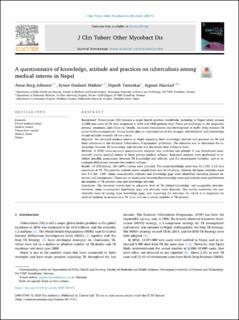| dc.description.abstract | Background
Tuberculosis (TB) remains a major health problem worldwide, including in Nepal where around 33,000 new cases of TB were diagnosed in 2018 and 5400 patients died. There are challenges in the diagnostic process, treatment, and follow-up. Deaths, increased transmission and development of multi- drug resistant TB could be the consequences. Young doctors play an important role in this struggle, and therefore, their knowledge of and attitudes towards TB are crucial.
Objective
We surveyed medical interns in Nepal regarding their knowledge, attitude and practices on TB and their adherence to the National Tuberculosis Programmes’ guidelines. The objective was to determine the associations between TB knowledge, and attitude and the factors that influence them.
Methods
A WHO cross-sectional questionnaire template was modified and piloted. It was distributed anonymously among medical interns at three private medical colleges. Statistical analyses were performed to establish possible associations between TB knowledge and attitude, and the investigated variables, and to investigate differences between the medical colleges.
Results
Of 270 interns, 185 (69%) interns were included. The mean knowledge score was 13,3 (SD: 2,12) of a maximum of 19. The possible attitude scores ranged from zero to 14 points, whereas the mean attitudes score was 9,4 (SD: 1,89). Some unacceptable attitudes and knowledge gaps were identified, including disease detection and management. There was an association between the knowledge score and attitude score and between the number of TB patients seen and knowledge/attitude.
Conclusion
The surveyed interns had an adequate level of TB related knowledge, and acceptable attitudes. However, some unacceptable knowledge gaps and attitudes were detected. This survey underlines the considerable need of closing these knowledge gaps, and improving the attitudes, for which it is important for medical students to practice at a TB clinic and see a certain number of TB patients | en_US |

